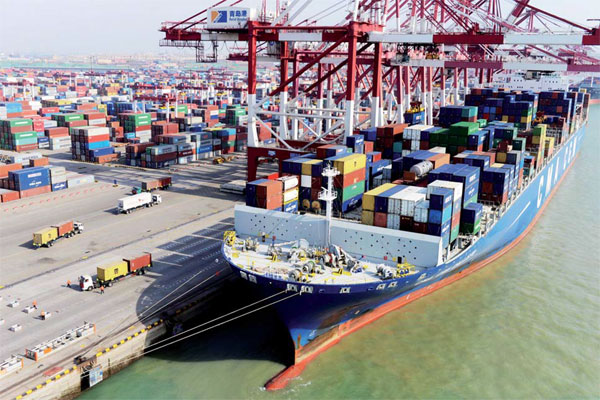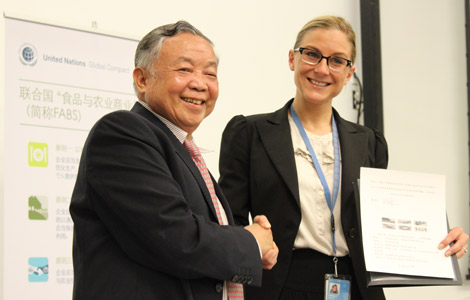A road that is made of water
Updated: 2014-06-16 07:58
By Todd Balazovic (China Daily USA)
|
||||||||
|
Qingdao plays a pivotal role in expanding the country's maritime economy. Provided to China Daily |
|
Qingdao is China's second-busiest port. Provided to China Daily |
Qingdao is drawing on its maritime setting to transform its economy
The city of Qingdao is best known for Tsingtao beer, its German connections and the sprawling coastline that make it one of China's best holiday spots. As China embraces economic transformation, Qingdao, in Shandong province, like many cities across the country, is looking for a new place in the sun, moving from the toil and sweat of manufacturing to industries that rely more on brain power, innovation and technology.
The city government is spending billions to retool local industry to adapt to what has been called the blue economy, in which the city is harnessing the power its maritime setting has endowed it with.
The central government has called for eight special marine development zones to be created by 2020, aiming to have marine resources contribute 7.05 trillion yuan ($1.1 trillion; 820 million euros) to the national economy by next year.
That economic shift, which is seen as building a maritime Silk Road, is geared toward drawing on ocean technology and resources beyond traditional fishing and tourism.
"One belt, one road has brought new opportunities to Qingdao," says Yao Shuqing, deputy director of Qingdao Port International Co Ltd.
"That means that as we build a new Silk Road, we are building a new economic belt. The old Silk Road was on land. The new one takes in the sea, and Qingdao is well placed for this."
As this transformation has been taking place, Shandong's marine sector has exceeded national GDP growth, growing 10.1 percent last year.
In 2012, the maritime industry accounted for more than 5 trillion yuan, the State Oceanic Administration says. Qingdao contributed 131.69 billion yuan of that, 18.2 percent higher than the year before.
"With Qingdao's research and development, innovation and environmental protection, it will be one of China's leading city maritime economies by next year," says Li Qun, the city's Party chief.
One need only look at the city's largest operating port to fully appreciate how pivotal Qingdao is for China in expanding its maritime economy.
Huangdao port is on the outskirts of the city, a 75-minute drive from the downtown area. The trip, passing over the 41.6-kilometer Jiaozhou Bay Bridge, which Guinness World Records has listed as the world's longest bridge over water, offers a small window into the hundreds of seafood farms operating in the city.
The floating farms, which cast 1 sq km grid nets that carpet the bay, primarily produce clams, shrimp and sea cucumbers, which contributed 14.5 billion yuan to the city's marine economy last year, says Yu Chengpu, director of Qingdao Ocean and Fisheries Bureau.
Qinhuangdao port, the seventh-busiest in the world, is a labyrinth of shipping containers, stacked five to seven units high, towering over the raised highway pass leading to the main entry gate.
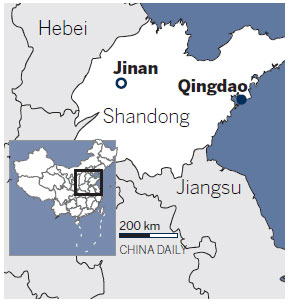
The hundreds of trucks that roll in and out each day carrying goods are stopped at a checkpoint, where guards with mirrors minutely scrutinize their contents. The checkpoint is the last line of defense against illegal goods entering or leaving the country, a guide says.
For international business, Qingdao is China's second-busiest port, after Shanghai, importing goods such as cars from Japan and South Korea, ores from Africa and India and soybeans from the United States, Yao says.
It is also China's largest coal shipping port and No 1 crude oil port, playing a pivotal role distributing the largest sources of energy in the country.
Yao says the port will come into play when attracting investors, domestic and international, for the launch of its IPO in the "near future". The date has yet to be set, and port authorities are not ready to announce details, he says.
Completing the Silk Road circuit, inland transport will provide access for provinces as far away as the Xinjiang Uyghur autonomous region and allow Qingdao to act as the port of origin for Chinese exports to countries in Central Asia such as Kazakhstan and Kyrgyzstan.
"This also includes the export of our local goods," Yao says, noting that the city is home to Haier, China's largest international home appliance company.
In the central business district the city is drawing on its position as a gateway to China to entice investment from overseas companies.
With more than 11,000 foreign-funded companies, most of them Japanese and South Korean, but with access to 114 of the world's Fortune 500 companies, international trade has become a crucial component in helping fund expansion.
Foreign companies generated 40 percent of the city's tax revenue, last year.
As the city aims to increase its standing as an international trading city, it is now looking at plans for a free-trade port geared toward attracting more business from Asian countries.
Even as the city looks to the sea to make money, it is also employing top minds to find inspiration and innovation beneath the waves.
Blue Silicon Valley, which drew initial investment of more than 40 billion yuan, has been one of Qingdao's answers to the national call for innovation. In the area, covering about 580 square kilometers of the city, more than 70 projects, ranging from technology development to research, most with a nautical theme, are being built.
"The areas we are concentrating on are marine biology, seawater resource exploration, new materials and renewable energy, oceanographic instruments and marine equipment manufacturing," says the city's Party chief Li.
Facilities such as the National Laboratory for Oceanic Science and Technology, expected to be completed this year, and the National Deep Sea Base, expected to open late next year, will be the venues for some of the most up-to-date oceanic research in the country.
"Half of the country's top marine scientists work in the city and have won half of China's marine innovation awards," says Liu Mingjun, deputy mayor of Qingdao.
toddbalazovic@chinadaily.com.cn
(China Daily USA 06/16/2014 page15)

 World Cup fever grips Chinese soccer fans
World Cup fever grips Chinese soccer fans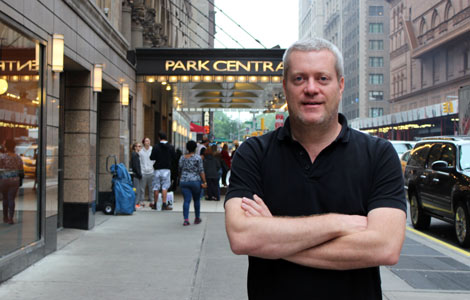
 Former Alibaba VP wants his documentary on US TV
Former Alibaba VP wants his documentary on US TV
 Consul general welcomed
Consul general welcomed
 Tender moments of world leaders with their children
Tender moments of world leaders with their children
 Chinese fleet joins others for RIMPAC exercise
Chinese fleet joins others for RIMPAC exercise
 Obama visits native American reservation
Obama visits native American reservation
 Clinton has reasons to run at her ready
Clinton has reasons to run at her ready
 Angelina Jolie shines at summit against sexual violence
Angelina Jolie shines at summit against sexual violence
Most Viewed
Editor's Picks

|

|

|

|

|
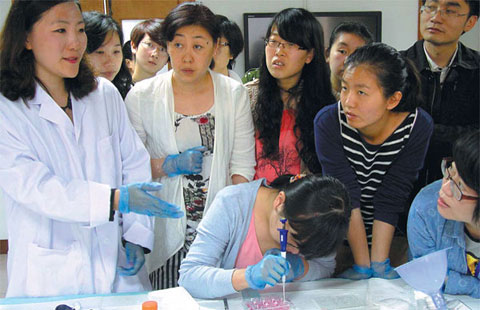
|
Today's Top News
US should 'attune itself to China's rise'
US hay helping China's dairy needs
Chinese TV show expands to US
Former US congressman: Diaoyu belongs to China
US options could help combat advances by Iraqi militants
US applauds voting in Afghan presidential polls
Oregon high school shooter's parents offer apology
Army: Bergdahl 'looked good' after returning to US
US Weekly

|

|

